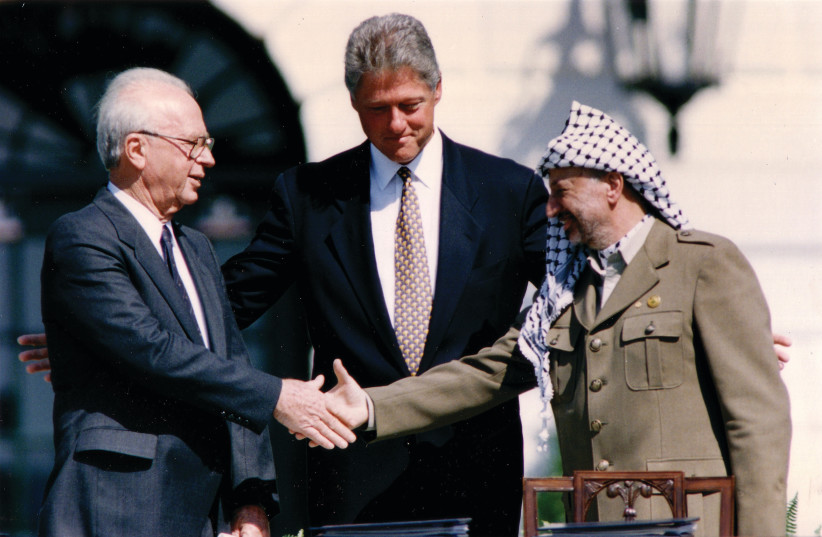On this day: 28 years since the assassination of Yitzhak Rabin
On this day, 29 years ago, former Prime Minister Yitzhak Rabin – an official who is best remembered for his push for a peace deal between the Jewish state and its surrounding Arab neighbors – was assassinated.
While officials hold an annual commemoration for Rabin on Mount Herzl, the surviving family of the visionary told Ynet they were requesting that this year’s be canceled due to the war. The request was granted by MK Amir Ohana.
Rabin, born in Jerusalem in 1922, was assassinated by 25-year-old law student Yigal Amir on November 4, 1995.
As Rabin left Tel Aviv’s Kings of Israel Square, which was posthumously renamed after Rabin, Amir shot at the prime minister three times, hitting him in the back and stomach.
Rabin was rushed to Tel Aviv’s Ichilov Hospital, where he died an hour later on the operating table.

Amir was sentenced to life in prison for the murder and later received an additional 8 years sentencing for wounding Rabin’s bodyguard during the attack. He admitted to the attack in court, stating he killed Rabin to stop land from being given away.
Amir has since enlisted multiple lawyers’ help to gain early release from prison.
The legacy of Yitzhak Rabin
The prime minister’s 25-year-old killer strongly opposed the Oslo Accords – a Clinton Era agreement accepted by the Palestinian Liberation Organization and Israel that would see peace in exchange for the Palestinian Authority governing over the West Bank and Gaza.
“The world has lost one of its greatest men, a warrior for his nation’s freedom and now a martyr for his nation’s peace,” then US President Bill Clinton said on news of Rabin’s death. “For half a century, Yitzhak Rabin risked his life to defend his country. Today, he gave his life to bring it a lasting peace. His last act, his last words were in defense of that peace he did so much to create. Peace must be and peace will be Prime Minister Rabin’s lasting legacy.”
His efforts to achieve peace were recognized by the Nobel Prize, which awarded him a peace prize in 1994 “for their efforts to create peace in the Middle East.” He shared the prize with former Foreign Affairs Minister Shimon Peres and the former Palestinian leader Yasser Arafat.
In addition to being prime minister of the state, Rabin served as the seventh Chief of Staff of the IDF, achieving the title of Lt. Gen.
As surrounding Arab states armed themselves with soviet weaponry, Rabin was credited with the forethought to purchase American weapons and new technologies while continuing to prepare Israel’s IDF for large-scale operations.
It was these decisions that aided Israel’s quick success during the Six-Day War of 1967, according to the IDF.
For his role in Israel’s success, the Hebrew University of Jerusalem awarded Lt. Gen. Yitzhak Rabin an honorary doctorate. While delivering his speech at the university, the IDF noted that Rabin focused on the cost of war for both Israel and the enemy states.
“The men in the front lines saw with their own eyes not only the glory of victory, but also its cost, their comrades fallen beside them soaked in blood. And I know that the terrible price the enemy paid has also deeply moved many of our men,” he said.
As Lebanese and Syrian leaders attempted to divert water away from Israel, Rabin led the IDF away from plans that would see partial occupation of the foreign nations. Instead, Rabin directed the military to destroy water-diverting infrastructure – allowing fewer casualties for enemy armies.





Comments are closed.